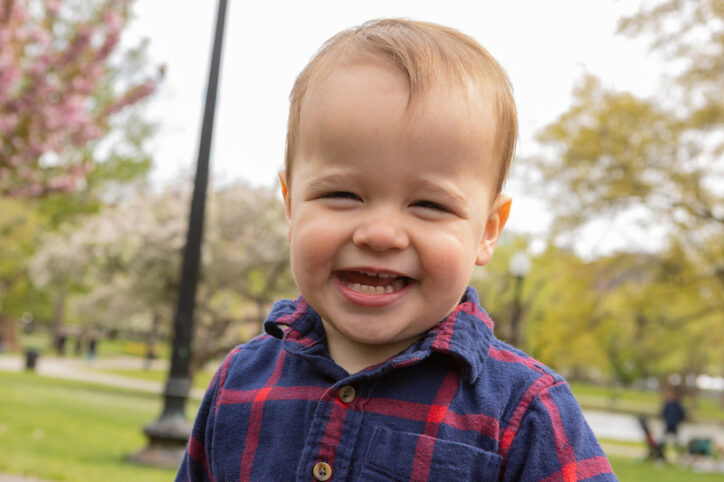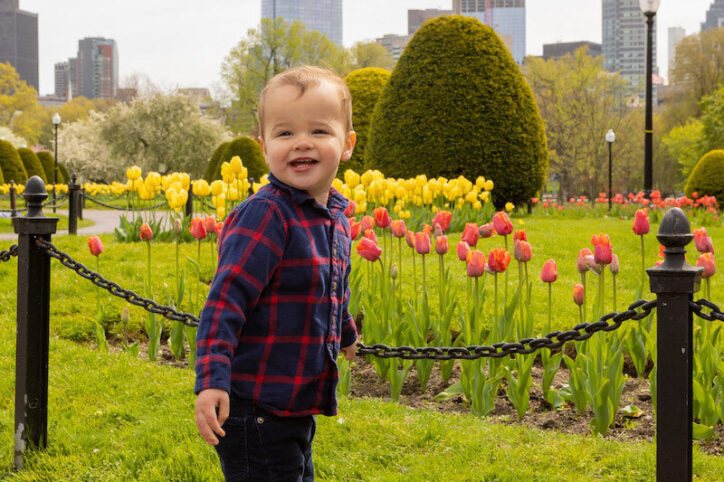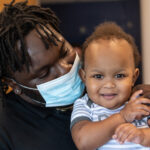‘I did it!’ Micah is thriving after maternal-fetal care for a CPAM

Dr. Marla Lipsyc-Sharf is no stranger to the field of medicine: As a medical oncology fellow, she’s familiar with the human body and the health challenges that can arise. But it still came as a shock when — 20 weeks into a healthy pregnancy — she and her husband, Jeremiah, learned during an ultrasound that their son, Micah, appeared to have a large abdominal mass.
“We were totally freaked out,” Marla admits. Almost immediately, her obstetrician referred her to the Maternal Fetal Care Center (MFCC) at Boston Children’s Hospital so the couple could learn more about their options. “I was so relieved that there was a place nearby that was dedicated to caring for both Micah and me,” Marla says.

Seeking answers to the unknowable
The family’s first appointment with the team at the MFCC was a long one: After undergoing additional testing, including another ultrasound and an MRI, Marla and Jeremiah met with surgeon Dr. Belinda Dickie. “It’s such a stressful situation, so we were grateful to have all the tests completed in one day,” says Marla. That stress was further eased by nurse Lauren Farqui and social worker Kassie Merrill Olver, who attended every appointment and took notes for the couple. “This allowed us to focus on asking questions — and we had a lot of questions.”
So did the MFCC team. The imaging results confirmed that Micah had a large mass below his diaphragm, but the cause was still unclear. It could be a pulmonary sequestration, a rare type of congenital pulmonary airway malformation (CPAM) in which a mass of abnormal tissue forms in the lung. Or it could be neuroblastoma, a type of cancer that forms during fetal development. Over the next several months, Marla met with Dr. Dickie multiple times to monitor the mass, which couldn’t fully be diagnosed until it was surgically removed.
Although the uncertainty was nerve-wracking, Marla still felt reassured. “We were so confident in this team that we felt if they didn’t know the answer, it was impossible to know,” she says.

Successful surgery for CPAM
Regardless of the cause, Micah’s mass wouldn’t be removed until he was at least 6 months old, allowing him time to grow — and time for him to bond with his parents. By then, Dr. Dickie was fairly confident that the mass was a CPAM. Although this type of CPAM is benign, it can lead to frequent pneumonia and even heart failure later in life and requires constant monitoring. Although they were nervous about Micah undergoing surgery, Marla and Jeremiah knew that was his best option.
After a five-hour procedure to remove the CPAM, they were relieved — and Micah was soon back to his old self, smiling and playing peek-a-boo from his crib. “We felt like a weight had been lifted,” says Jeremiah.
Now almost 2 years old, Micah is thriving. A “people person,” he loves attending daycare, playing ball, and looking at books. And while his parents love Dr. Dickie, they’re thrilled that he won’t require any additional follow-up care. Perhaps it’s no accident that Micah’s new favorite catchphrase is “I did it!”
Learn more about the Maternal Fetal Care Center.
Related Posts :
-

Unstoppable: Cairo’s journey for kidney care began even before birth
Like lots of babies, Cairo Carter was born screaming — and his parents were thrilled. “We just wanted him to scream ...
-

‘Our silver lining’: Mila is thriving after CDH repair
For Katie, last St. Patrick’s Day wasn’t an occasion for revelry. Instead, it was the day an ultrasound ...
-

From Cape Verde for coordinated CDH care
Most parents have never heard of congenital diaphragmatic hernia (CDH), a rare and potentially life-threatening condition in which a baby ...
-

Making it through the fight: Scarlett's CDH journey
Like her name suggests, Scarlett Virginia Moulton “has a lot of fire,” says her mother, Olivia. “She always has a ...





